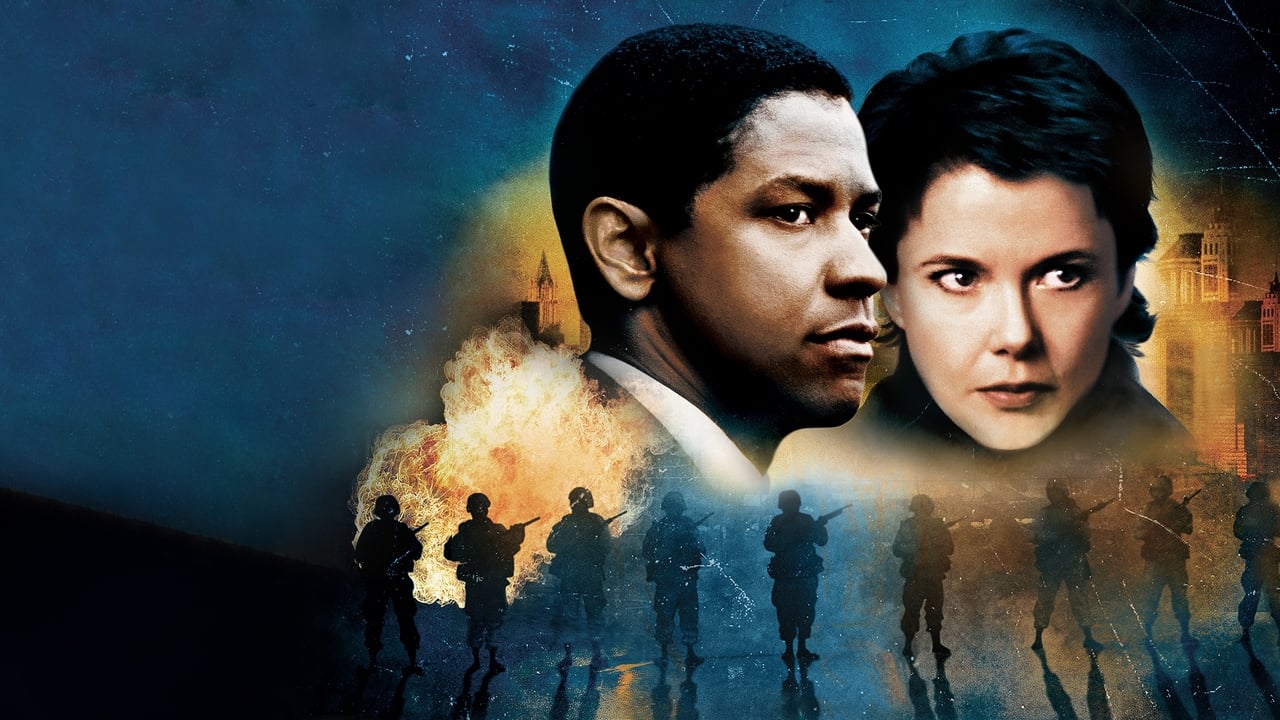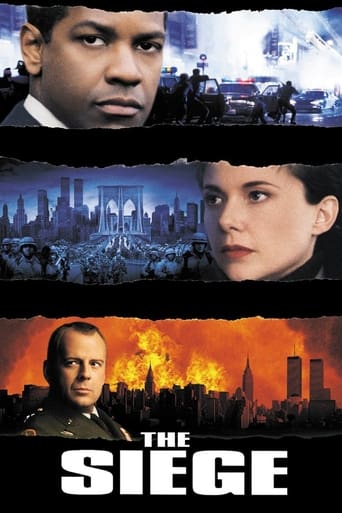Linbeymusol
Wonderful character development!
Diagonaldi
Very well executed
Stevecorp
Don't listen to the negative reviews
Bergorks
If you like to be scared, if you like to laugh, and if you like to learn a thing or two at the movies, this absolutely cannot be missed.
zkonedog
While watching this film for the second time about a week or so ago, the first thought that came to my mind was "Wow, this is exactly the kind of political/dramatic intrigue that the TV series '24' tries to accomplish each and every episode". A weaving of action, political subject matter, and gut-wrenching emotional moments puts "The Siege" up towards the top of my list (just below "A Few Good Men") of politically-based thrillers.The basic plot of the film centers on a terrorist cell that launches a series of attacks based in New York City. Denzel Washington plays a government agent given the task of coordinating the effort to subdue the terrorism, while Bruce Willis is the military general brought onto the scene when the situation begins spiraling out of control. It is rather remarkable that this film was actually made BEFORE 9/11, as it deals with some of the exact same subject matter, including the reaction to terrorism, internment camps (this time for Muslim-Americans), and the ideological clash between the Eastern and Western world.Acting-wise, Washington is at his brooding, intense best throughout the entire movie, culminating with his "bend the law, shred the constitution" speech when dealing with the issue of torture. Willis' military character is actually sorely underutilized, yet provides the perfect antithesis (but not antagonist) to Washington. Annette Bening is the other primary lead character, and she also gives a competent (if not over-the-top at times) performance.About the only reason I give this film four stars instead of five is because, although it is compelling, it falls well short of the mark now set by "24" which provides just as much political drama/action in a arc of episodes as this movie does in its entire runtime (although that is more of an affirmation of 24's genius than this film's shortcomings). If you are a fan of political films that will really make you think, you will heartily enjoy the entire experience. Plus, it could be your stepping-stone to an entirely new saga of political drama..."24".
phasetrek
Five years after the first World Trade Center bombing in 1993, this film came out ... supposing what would happen if radical Islamic terror became so frequent in New York City that the U.S. government would declare martial law there. Included in that scenario was the detention of Muslims in New York City ... along the same lines as the detention of persons of Japanese ancestry (including U.S. citizens) during World War II. Not so strangely, this movie and others along the same lines (ie., 1994's "True Lies") drew heavy criticism from the U.S. Muslim community for portraying the religion, as a whole, in a bad light. This criticism became so forceful as to make Hollywood "re-think" such movies. Example? The Tom Clancy novel, "The Sum of All Fears," dealt with Islamic terrorists. But when Hollywood got their hands on it in 2002, the Islamic terrorists were re-cast as Neo-Nazi terrorists for the movie."The Siege," however (major spoiler alert), had one component that infuriated the Muslim community ... namely the character Samir who, at first, was painted as a peaceful mainstream Muslim - but who later turned out to be the last member of his own domestic terror cell who, in theory, was granting student visas to other Muslims who were entering this country (only to become terrorists themselves). In short, Samir was the one kind of person that scares a lot of mainstream Muslims and all other persons, regardless of their religion -- a person who feigns the role of a moderate Muslim but, in reality, is a domestic terrorist.Just a personal historic tidbit. On S.E. Clinton Street in Portland, Oregon, there's a small mom & pop style grocery store that has been around for many years. But back during the early years of World War II, it was owned and operated by a Japanese-American family (Mr. Funitake, his wife, and their teenage son). My mother went to high school with the son. When the detention of persons with Japanese ancestry took place, government officials rounded up the Funitake family. Initially, they were scheduled to be detained in an internment facility with others of Japanese ancestry. But when these officials inspected the store (a store on the bottom floor with their living quarters on the 2nd floor), they found Japanese military documents, shortwave radio equipment, and an extensive collection of shipping manifest data - detailing all shipping into and out of the Port of Portland. In short, the Funitake family (at least Mr. & Mrs. Funitake) were Japanese spies.While this doesn't excuse the wholesale internment of persons of Japanese ancestry during World War II, it does point out an equally painful fact ... that sometimes, the government hit "paydirt." And in this film, Samir is an example of that paydirt ... normally innocent-looking people who are in the United States with "ulterior motives" detrimental to the health/life of mainstream Americans of all origins/faiths. On top of that, you have to remember one of Samir's last comments ... that his terror cell was not the "last" terror cell.So, all this leaves people in an ethical quandary. On one hand, you have the American mindset that tells you internment of people based on ethnic origins and/or religion is wrong. But on the other hand, you have to ask yourselves how many lives have been spared by "finding" this paydirt. Which is the "greater good?" Surely, the Funitake family wasn't alone - that there were other Japanese spies on U.S. soil during WWII. And just as surely, peaceful appearances among our nation's Muslims can be deceiving - at least sometimes. It's a tough nut to crack and, hopefully, our nation will figure out "how" to crack it without too much collateral damage.Denzel Washington, Annette Bening, and Bruce Willis played their roles in a spectacular manner. But kudos goes out to Sami Bouajila (Samir) for his portrayal of the person "believed" to be peaceful who turned out to be a domestic terrorist. And special kudos go out to Tony Shalhoub who played Denzel Washington's FBI partner (of Middle-Eastern descent) ... whose own son becomes a victim of the detention. This would be a tough topic for any movie to handle in today's world ... but it was handled well in this pre-911 film.
soanseinc
When a movie portrays a decorated general as more of a criminal than a group of radical Islamic terrorists it is dishonest and disgusting. One hero of the movie was a terrorist sympathizer and partly responsible for the murder of many Americans in the movie. Liberal writers once again display their "special kind of stupid" relating to foreign policy, global affairs, and their hate/disrespect for our military.
Wuchak
Released in 1998, "The Siege" chronicles events as New York City becomes the target of escalating terrorist attacks after the abduction of an Islamic leader by the US military. The head of the FBI's Counter-Terrorism Task Force (Denzel Washington) teams up with a CIA operative (Annette Benning) to hunt down the terrorist cells responsible for the attacks. Ultimately, the US government declares martial law and sends in the troops, led by General Devereaux (Bruce Willis). Tony Shalhoub plays the FBI agent's Arab-American partner while Sami Bouajila plays a seemingly suspicious Arab-American.While clueless PC morons have criticized this movie as "racist propaganda" it dared to show the awful truth in the late 90s and was nigh prophetic in light of 9/11 occurring less than three years later. There are numerous noble Arab-Americans, and the movie emphasizes this, but – let's be honest – there are also Islamic whack-jobs in our midst who enjoy blowing themselves up with as many innocents as possible so they can go home to Allah and 72 virgins (or whatever).I like the fact that General Devereaux (Willis) isn't a black or white character and viewers can have completely different views about whether or not he's actually a villain. The movie shows that he's a professional soldier who warns the governmental leaders exactly what would happen under martial Law, a suspension of all civilian rights guaranteed under the constitution, clearly cautioning them that they might not like the form of medicine martial law dishes out. But it's a desperate situation and they give him the go-ahead, so he offers up exactly what he said he would give. He has his methods to protect his country and performs them with conviction. The terrorists were killing masses of innocents and he's commissioned to stop it, which is what he does, PC or not. Does this make him evil? These are questions the movie provokes and you'll have to answer them for yourself.This is a quality movie that frankly addresses relevant topics and tries to be fair and balanced, but it sorta shoots itself in the foot at the end. Read the spoiler commentary below for details.The film runs 116 minutes and was shot in New York City with a couple scenes in California.GRADE: B- ***SPOILER ALERT*** DON'T READ FURTHER IF YOU HAVEN'T SEEN THE FILM One of the main points of the movie is that it's wrong to mistreat Muslim-Americans by profiling them, rounding them up and subjecting them to investigation outside normal procedures because it's equivalent to the internment of Japanese Americans during WW2. There are two problems with this: (1.) It isn't the same issue. Interning the Japanese was wrong because the government was rounding them up based on their ETHNIC HERITAGE. The Feds would've interned German-Americans if they used the same logic. The issue with Muslim terrorism isn't ethnicity, but rather religion. Statistically, most terrorists against the US are Muslims of Middle Eastern descent. Therefore "profiling" them is simply acting in accord with statistics. That's just cold hard logic, not racism. By contrast, interning Japanese-Americans during WW2 wasn't logical.(2.) More importantly, the movie undermines itself by having Samir turn out to be a radical suicide bomber. This revelation demonstrates that peaceful Muslims can't be trusted, just as the Army and their supporters believed (in the movie). There's no reason to assume that any of the rank-and-file Muslims depicted couldn't have turned out to be terrorists just like Samir. This being the case, the army was right to intern and interrogate them. As you can see, the movie takes a noble position and then inexplicably contradicts it.

